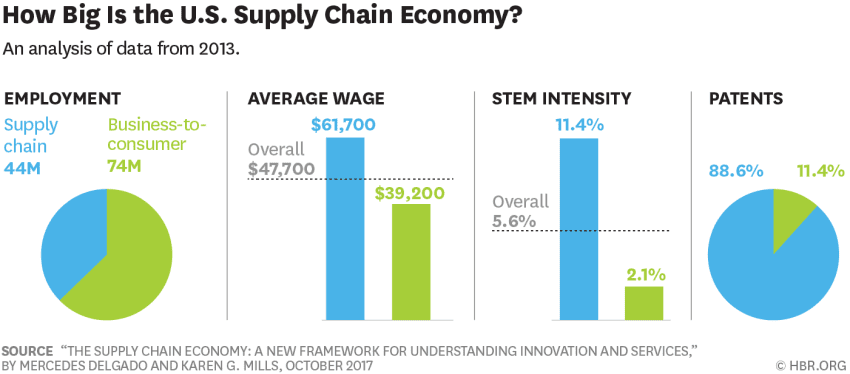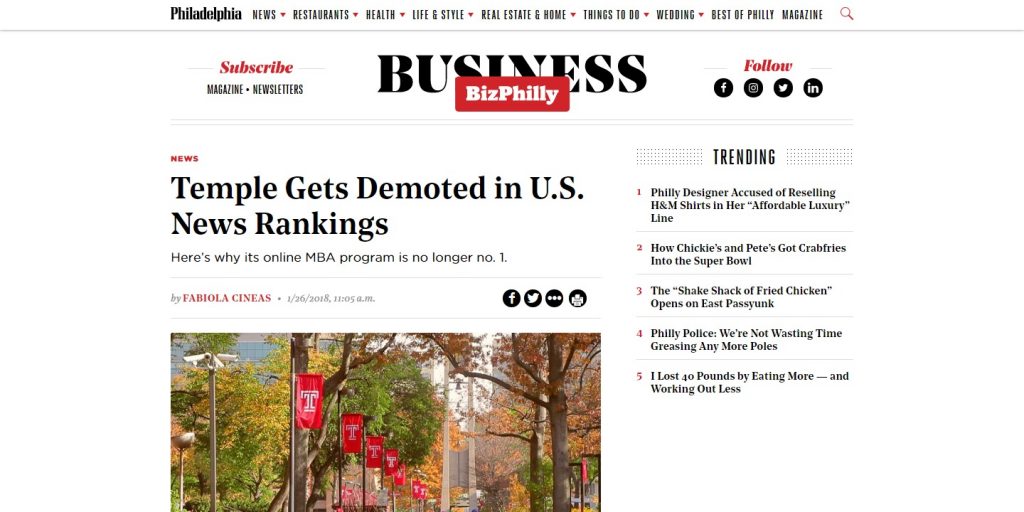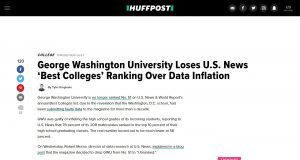Hot MBA Jobs: Computer and Information Systems Manager

For those looking to pursue a management career at the tech end of the business world, Computer and Information Systems Manager may be a promising career to pursue.
The U.S. Bureau of Labor Statistics estimates the growth rate for this job at 12 percent over the next eight years. But, are you not sure where to begin? Below, we’ve put together a guide to help you determine if this is the career for you.
What is a Computer and Information Systems Manager?
The Computer and Information Systems Manager (or IT Manager) runs the company activities related to computers and tech. They must assess the needs of an organization to determine the appropriate hardware and software to both meet demands of and enhance the efficiency of company business. In addition to installing and maintaining hardware and software, IT Managers must stay abreast of new tech developments so that they can pitch ideas to upper-management should they identify an opportunity to implement technology that would advance the company’s mission. The IT Manager also directs and organizes the efforts of the lower-level positions in the IT department.
There are different types of Computer and Information System Managers, so duties may be more specifically tailored depending on the specific title. For example, an IT Security Manager would work with the tech as it pertains to protecting an organization’s security interests.
Am I A Good Fit?
IT Managers possess solid analytical skills. People in this role need to be able accurately evaluate a company’s needs and determine which products would enhance productivity. They must also be able to analyze any tech and management issues to ensure that their department runs smoothly. They are solid, decisive leaders and creative thinkers. Communication skills are essential, as IT Managers must communicate directions to those working under them, as well as deliver presentations to higher-level execs.
In 2017, the average base pay for a Computer and Information Systems Manager, according to Glassdoor, was $106,092 in the United States.

Education and Where to Begin
The minimum degree requirement for a Computer and Information Systems Manager is generally a bachelor’s with a tech-related major. However, according to the U.S. Bureau of Labor Statistics, companies often require graduate degrees, and earning an MBA could prove to be a huge asset. If you are looking to pursue this title, it may be beneficial to start with entry-level tech positions in your field to gain a few years of experience before applying to a manager position.
An MBA program with a top-notch tech education may be a good place to start if you’re hoping to become an IT Manager. In 2018, U.S. News made a list of the best MBA Information Systems programs. Below, we’ve pulled some of our favorite MBAs from the list:
Sloan School of Management – MIT
It should come as no surprise that MIT Sloan tops the list of best Information Systems programs. MIT has long been hallowed ground for the technologically-inclined, so it makes sense that the school’s MBA program also caters to those with a bent toward tech, with 26.2 percent of the 2017 graduating class pursuing careers in the software and internet industries.
McCombs School of Business – University of Texas at Austin
McCombs, which has a nationally-ranked MBA in Information Systems program, is a desirable choice for the STEM-savvy. According to the McCombs employment report, 30 percent of the class of 2016 pursued jobs in the tech industry.
Scheller College of Business – Georgia Tech
Georgia Tech’ Scheller College of Business is an excellent choice for aspiring IT Managers. Forbes states, “Because many students are interested in more quantitative and technical areas, such as operations management and information technology management, Scheller is often viewed as a heavily quantitatively based program.” Roughly 21 percent of the Scheller class of 2017 landed tech-related jobs.
Leavey School of Business – Santa Clara University
For Silicon Valley hopefuls, the Leavey School of Business may be a wise school to consider. With flexible options like the Online and Evening MBA’s, Leavey allows students to tailor the program to their schedule. This may be desirable for those trying to balance internships or work and family life.
Temple Fox School of Business Reveals More Rankings Details

Shortly after the forced resignation of longtime Dean Moshe Porat and hiring of his interim replacement Ronald C. Anderson, the Temple University Fox School of Business released more details following this year’s ratings fallout with U.S. News & World Report.
In a new letter from Temple University President Richard M. Englert and Executive Vice President and Provost JoAnne A. Epps revealed that the business school submitted false data regarding not only its Online MBA program—which was ranked first overall by U.S. News & World Report for four straight years—but the “Executive MBA, Global MBA, Part-Time MBA, Master of Science in Human Resource Management and Master of Science in Digital Innovation in Marketing” as well.
Englert and Epps states:
“These programs all had issues related to the reporting of one or more metrics, including the number of new entrants providing GRE/GMAT scores, student indebtedness and applicants’ undergraduate GPAs. For the Online Bachelor of Business Administration, misreporting related to student indebtedness was found. As a result, we have reported to U.S. News that we cannot verify data related to these programs, and we are not participating in or submitting business school surveys at this time.
We want all the members of the university community to know that, with respect to the misreporting of information at the Fox School, you had a right to expect this information would be accurate and honest. We deeply regret that this did not happen. We will do more than own this problem. We will fix it. And none of this takes away from the quality education that our Fox School students receive, or from the excellent teaching and research of its faculty.”
As a whole, the letter is a concerted effort at more transparency from the university, given the sensitive nature of the situation since being removed from U.S. News is January of this year.
The two go on to say:
“Integrity in the way we conduct and represent ourselves to the world is a fundamental value at Temple. The university is committed to the highest standards of accuracy in its data submissions to rankings organizations and has implemented rigorous new university-wide procedures to ensure this. As we said earlier this month, Temple is in contact with a number of agencies that have an interest in this matter. We are updating them as new information develops. We continue to diligently pursue the review of rankings data and will share additional updates.
We would also like to take this opportunity to thank the university staff who have been working so diligently in carefully reviewing thousands upon thousands of data elements in the Fox School and university-wide. It is through their tireless efforts that we are able to ensure we report proper information going forward, and can be open and transparent with all of you.”
You can read the entire letter from Temple here. Stay tuned for more information on the story as it continues to unfold.
BREAKING: Temple Fox Business Dean Moshe Porat Resigns

Months after U.S. News & World Report officially removed the Temple University Fox School of Business from its annual rankings, dean Moshe Porat has been officially asked to step down from his role.
MIT Explores Happiness, and More – Boston News

Let’s explore some of the most interesting stories that have emerged from Boston business schools this week.
Probing the Origins of Happiness – MIT Newsroom
On the #InternationalDayofHappiness, Kara Baskin at the MIT Sloan School of Management explored the new book “The Origins of Happiness: The Science of Well-Being over the Life Course,” which was co-authored by MIT Sloan Ph.D. student George Ward. Talking about his work, Ward explains how global governments have been attempting to tap into the data of happiness in hopes of shaping future policies.
“We wanted to bring together this body of work in a systematic, quantitative way,” he explains. “Often, these are single studies that say ‘x’ is important for happiness; ‘y’ is important for happiness. In this book we try to provide an overarching framework that documents what makes for a satisfying life.”
“On the policy side,” he continues, “more and more countries are using well-being data in the real world. As we speak to policymakers, they often ask the question: ‘Look, we’re measuring this now and we have the impetus to improve these figures, move up these tables of happiness, and make our citizens enjoy their lives more. What can we do?'”
You can read the rest of the Ward interview here, and grab a copy of “The Origins of Happiness: The Science of Well-Being over the Life Course” today.
The Supply Chain Economy and the Future of Good Jobs in America – Harvard Business Review
The Harvard Business Review recently published an article from Mercedes Delgado and Karen Mills that outlines the increased role service suppliers will play in what some have dubbed the “supply chain economy.” Supply chain industries are simply “businesses that manufacture parts to be used in a final good,” like plastic injection molders and metal stampers.

These industries “have a crucial role in driving innovation and creating well-paying jobs,” in part because they “have downstream linkages to multiple industries, which allows the innovations they create to cascade and diffuse across the economy, potentially increasing the value of those innovations.”
Read more about HBS’ policy suggestions to emphasize “suppliers’ access to skilled labor, buyers, and capital” here.
BU Grad Schools Among Nation’s Best – BU Today
Several schools in the Boston metro saw a nice rankings boost in the recently release U.S. News & World Report Best Business Schools 2019 list, with the Questrom School of Business at Boston University leaping up two spots overall from last year, up to 42nd overall. The school’s part-time program also finished 10 spots better than last year, coming in 32nd overall.
In a release, Kenneth Freeman, Allen Questrom Professor and Dean in Management, said, “Rankings are inherently imperfect, but we appreciate the acknowledgement of the quality and reputation of our students, program, and alumni. Each year, we adjust our curricular content in response to student needs and our increasingly engaged corporate partners to create experiential opportunities to bridge the classroom and industry.”
You can catch up on the rest of BU’s graduate schools in the new ranking here.
How to Begin Your MBA Search, Part I

You’ve weighed your options, and it seems like getting an MBA might be the best route to attaining your professional and personal goals. You’ve considered the expense and the time spent away from the workforce that an MBA requires, and you’re finally ready to begin your MBA search.
You’ve even read Philip Delves Broughton’s advice against attending business school in The Economist, and still find yourself cracking GMAT Study Guides and searching ROI figures in U.S. News & World Report. But even if you’re the most motivated future MBA, it is of utmost importance to ask yourself a number of questions as you embark on the process of applying and gaining admission to business school.
“Understand Where You Want to End Up Before You Even Begin”
Those are the wise words of Jeremy Schifeling, the founder of Break Into Tech and a veritable guru on the subject of how to find meaningful work in the tech world without engineering experience. A graduate of the University of Michigan’s Ross School of Business, Schifeling also speaks to his experiences there, adding that “way too many people show up on campus just because other people are doing the same. And without a plan, they walk away two years later, six-figures poorer but not six-figures wiser.”
The end lesson from Jeremy’s advice? Suss out what you want to do with an MBA, and don’t just go into a b-school program to make a lot money, or because everyone else seems to be doing so. Make a plan, and even if that plan changes, you’ll still have a leg up on many of your classmates.

Figure Out What Programs Best Fit Your Plan
Let’s imagine that you know that you are interested in supply chain management. You could search around the web for schools that have special programs in logistics and supply chains, but that will only take you so far. Consultant Stacy Blackman notes, “some of our clients call up companies they are interested in working with to learn their opinions of target schools and where they recruit. If you are very specific about where you want to end up, this is a great idea.” Thus, if you’re certain about a career in operations and logistics, it might behoove you to contact companies like XPO Logistics or Werner Enterprises to see what b-school programs their management team recruits from.
If you’re not certain of exactly what career you want an MBA to lead to, but you have a general idea of the business field that you’d like to pursue, then it might be more reasonable to think about where you want to end up.
Location, Location, Location
Paul Bodine of Paul Bodine Consulting/Admitify says that it is absolutely necessary to ask yourself, “what geographies are essential to your post-MBA career and/or life goals?” The question can make all the difference in what schools you consider applying to—Bodine notes that “you can spare yourself the challenge of seeking admission to the top 10 schools if you have a defined region where you want to make your stand professionally and personally.” If you are wedded to working in traditional commodities markets (and bitcoin, surprisingly), then it wouldn’t make sense to stray far from the Chicago Mercantile Exchange, for example. If your search is geographically limited for reasons beyond your control, then find out which programs suit your needs best within that area. A tech business mind in the South might ponder schools in Knoxville or Atlanta, whereas a future lumber baron in the Pacific Northwest need look no further than Oregon State in Corvallis. There are opportunities everywhere, but it is up to you to find those that are most in line with your goals!
Stay tuned for part two of our series, coming soon!
Caught: Why Business Schools Might Lie to Improve Rankings

School rankings from sites like Forbes or U.S. News & World Report are often a crucial factor for students before they decide where they should pursue a degree. Using a combination of rankings, standardized test scores, job placement after graduation, and tuition costs, among other crucial factors, a school ranking a quick and succinct look at the relative merits and weaknesses of MBA programs throughout the country—and the world.
There is a lot riding on these rankings: not only do perspective MBAs often make decisions about where to pursue their degree based on these reviews, but graduates can use these rankings to demonstrate the quality of their degree to future employers. With such high stakes, organizations like U.S. News that compile these rankings rely on the accurate reporting of data from each business school.
So, what happens if the information is inaccurate, or worse? Data like student satisfaction and post-graduate salary—which can be so crucial in informing a prospective MBAs choice of school or program—is reported directly from the business schools, which often presents a conflict of interest potential. With so much at stake, would a school ever lie to increase their spot in the ranking?
Unfortunately, it seems the answer is yes. Just last week, the Online MBA program at Temple University’s Fox School of Business—a program that was consistently ranked in the top spot in U.S. News’ Online MBA ranking—vanished from the list. According to the initial announcement, new information had revealed that just 20 percent of Fox students in the Online MBA program had actually submitted test scores, a number that had initially been reported at a perfect 100 percent. Since the formula used by U.S. News weighs test score averages more if over 75 percent of students have submitted them, this inaccurate reporting from Temple Fox would have given the program an undeserved boost in the school ranking.

In the wake of Temple’s removal, questions continue to arise about the lengths schools go for good rankings/Photo via PhillyMag.
In the days since the initial announcement of Temple’s removal from the ranking, even more questions came out regarding the accuracy of Fox’s data. Further investigation found that Temple had reported 100 percent of students taking standardized admissions test for every year since 2014—a suspicious jump from the 25 and 33 percent that had been reported in the years prior. Since the test scores data submitted turned out to be inaccurate, it seems wholly possible that the data had also been misreported for the three years prior; the same years that Temple Fox held the top ranking for Online MBA programs.
This isn’t the first time it’s been discovered that business schools and even undergraduate programs have falsified or reported inaccurate data to boost its rankings. In 2013, Forbes was forced to remove four schools from its ranking of “America’s Best Colleges” due to inaccurate reporting: doctored SAT results from Bucknell University, false acceptance and graduation rates from Iona College, among others. In 2012, George Washington University lost its ranking on U.S. News’ “Best Colleges” list when it was discovered they were inflating the high school grades of their incoming students.

GWU was one of several schools in the past few years to submit false data for a rankings boost/via Huffington Post.
The problem may be even more far-reaching than some may suspect. In 2013, a survey of 576 college admissions officers found that 91 percent believed other colleges to be guilty of falsely reporting their admissions data. Even the school ranking creators themselves are shocked by this trend. In 2013, U.S. News editor Brian Kelly commented, “The integrity of data is important to everybody … I find it incredible to contemplate that institutions based on ethical behavior would be doing this.”
In 2005, the Association to Advance Collegiate School of Business (AACSB) took a deep look into this trend to examine why the issue of falsifying business school data might be so widespread. “Because rankings of full-time MBA programs are commonly presented under the label of ‘best b-schools,’ the public has developed a narrow definition about the breadth and value of business education,” the report states. Since most media rankings don’t consider factors like faculty research or doctoral education, MBA programs have become more likely to invest in more visible aspects of the program, such as facilities and marketing campaigns, which don’t actually deal with the quality of the degree. As a result, even high-quality programs may earn a lower media rank than they deserve based on the factors considered, adding pressure to do what it takes to earn a school ranking that matches what they perceive as the quality of the degree.
“Plenty of people apply to a school because it has reached the summit of a ‘best-of’ ranking, just as many people will see a movie or buy a book after it wins an award. That’s human nature,” Columbia Business School dean Glenn Hubbard told Fortune. “We want to experience the best.”
Whether or not placement in a school ranking truly represents the quality of a degree, it’s easy to see why the pressure is on for many admissions departments. A better school ranking can increase the number of applicants, providing for a more competitive, and diverse applicant pool, which creates a better quality admitted class. The cycle continues: success of these graduates can improve the possibility of future funding, providing more resources for the program and encouraging even more applicants to apply down the line.
“Rankings have become omnipresent in higher education, and they have enhanced the competition among institutions,” said Terry W. Hartle, senior vice president at the American Council on Education, in 2013. “And in any highly competitive environment, there is always a temptation to cut corners.”
For now, the Fox School of Business has been removed from the U.S. News Online MBA ranking. Concerns about false data continue to be evaluated, as organizations like AACSB continue to seek solutions and make recommendations for best practices when it comes to the collection and reporting of admissions data. In 2017, the AACSB publication “On Academic Rankings, Unacceptable Methods, and the Social Obligations of Business Schools,” suggested that schools and organizing bodies work together to find a method of data collection that includes “transparency, interpretability, and the empowerment of individual decision makers by whatever criteria truly suits their individual needs.”
For prospective students, its important to acknowledge this troubling but widespread trend as they make important decisions about where to earn a degree. While school ranking remains an easy way to compare programs against each other, students should consider not just the accuracy of the data but also the kind of factors reported in media rankings. While it seems possible that the number one program in a media ranking may not truly deserve that position, the real top program- the best for each individual’s needs and career goals—will always deserve first place.
